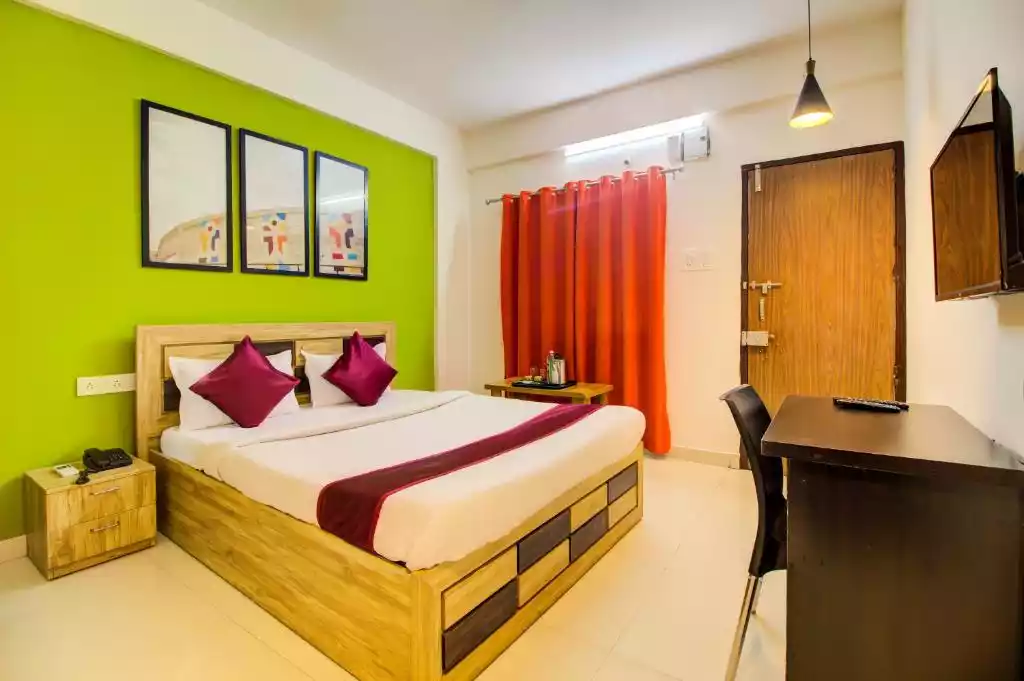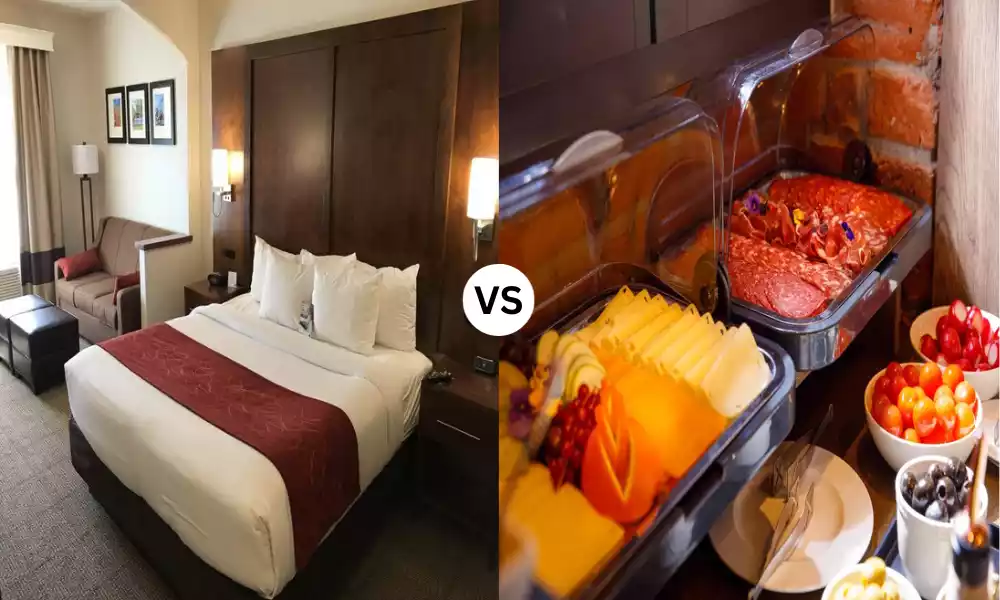Boarding and Lodging are terms frequently used in the hospitality industry to describe accommodation arrangements, but they cater to distinct needs and preferences. Boarding generally refers to an arrangement where both accommodation and meals are provided to the guests, often seen in boarding houses or hostels. Such setups often foster a sense of community and are especially convenient for those who prefer not to make separate food arrangements. On the other hand, lodging emphasizes providing a place to stay without the commitment of meals.
Hotels, motels, and inns are typical examples of lodging establishments. Guests have the freedom to explore local culinary delights or make their own food arrangements, offering greater flexibility during their stay. Both concepts, while different, aim to provide comfort and convenience to travelers, based on their specific needs and preferences.
What is Boarding?
Boarding refers to an arrangement in which accommodation is provided along with meals. This means that individuals who choose to board at a certain place not only get a place to sleep but also receive meals as part of their package.

Boarding can be found in various contexts:
- Boarding Houses: These are establishments, often residential homes, where individuals can rent rooms, typically for longer durations, and meals are served at set times.
- Schools and Colleges: Many educational institutions offer boarding facilities for students, especially those from distant places. These “boarding schools” or “residential schools” provide lodging and meals for students, ensuring their well-being while they pursue their studies.
- Hostels: Similar to boarding houses, but often catering to a younger crowd or travelers. Meals may be provided as part of the stay, either in a communal dining setting or through kitchen facilities where guests can prepare their own food.
The key aspect of boarding is the combination of both shelter and sustenance, making it a convenient option for many individuals, especially those looking for a more comprehensive and possibly communal living experience.
What is Lodging?
Lodging refers to the provision of a place to stay, usually on a short-term basis, without the inclusion of meals. It emphasizes accommodation over other services, although many lodging establishments do offer additional amenities.

Here are some contexts in which lodging can be found:
- Hotels: These are commercial establishments that provide rooms or suites for guests on a short-term basis. While many hotels have restaurants and room service, the cost of meals is typically separate from the room rate.
- Motels: A type of hotel, usually located near highways, designed for travelers with vehicles. Motels often offer parking directly outside the guest’s room.
- Inns: Often smaller than hotels and may be located in more rural settings. They provide rooms for travelers and might have a more personal or homey touch.
- Guesthouses: Similar to inns but usually in a residential setting, offering a more intimate experience. They might be run by families or individuals.
- Vacation Rentals: Properties like homes or apartments rented out by the owners for short periods, often facilitated by platforms like Airbnb or Vrbo.
- Hostels: Primarily catering to younger travelers or backpackers. While they can sometimes offer meals or kitchen facilities, the primary service is accommodation, often in shared dormitory-style rooms.
In essence, lodging gives travelers a place to sleep and rest, leaving them the freedom to choose their meal options and other services separately.
Comparison Table of Boarding and Lodging
Sure, here’s a comparison table between boarding and lodging:
| Criteria | Boarding | Lodging |
|---|---|---|
| Definition | Accommodation arrangement that includes both room and meals. | Provision of accommodation only, without meals included. |
| Typical Establishments | Boarding houses, hostels (some), boarding schools. | Hotels, motels, inns, guesthouses, vacation rentals, hostels (many). |
| Duration of Stay | Often longer durations; weekly or monthly rates may be available. | Typically short-term, ranging from one night to a few weeks. |
| Meal Arrangement | Meals provided, often communal. Fixed meal times might be present. | No meals included. Guests make their own meal arrangements or eat out. |
| Cost | Often a bundled price for both accommodation and meals. | Accommodation cost; meals and other amenities may be extra. |
| Flexibility & Autonomy | Limited meal choices, set meal times. | More flexibility in meal choices, time, and other services. |
| Social Interaction | More communal, fostering interactions among guests. | Depending on the establishment, might offer more privacy and less interaction. |
| Amenities | Basic amenities; focus on bed and meals. | Can range from basic to luxurious; may offer spa, gym, concierge services. |
| Best For | Students, long-term travelers, those seeking a community experience. | Short-term travelers, business travelers, vacationers seeking flexibility. |
This table provides a general comparison, and while many establishments fit these descriptions, there are always exceptions and overlaps in the real world. It’s important to research individual establishments to understand their specific offerings.
Benefits of Boarding and Lodging
The combined benefits of both boarding and lodging provide a comprehensive picture of the advantages of these accommodation arrangements. While boarding specifically refers to an arrangement where both meals and accommodation are provided, lodging focuses on the accommodation aspect without the inclusion of meals. Here are the benefits of both:
Benefits of Boarding:
- Convenience: No need to search for external dining options daily.
- Economical: Often, boarding establishments might offer a bundled rate for accommodation and meals, which could be cost-effective.
- Social Interaction: Communal areas in boarding houses or hostels encourage interactions, leading to new friendships and connections.
- Predictable Routine: Regular meal times and structured living can be reassuring for many.
- Safety: Especially for younger individuals or students, communal living can provide an added layer of safety.
- Hassle-Free Living: Absence of worries related to meal planning, grocery shopping, or cooking.
- Cultural Immersion: For travelers, shared meals can lead to deeper insights into local customs and cuisines.
- Focused Environment: In educational settings, boarding can lead to an environment optimized for learning and development.
- All-Inclusive Facilities: Many boarding facilities offer amenities such as laundry, Wi-Fi, cleaning services, and more.
Benefits of Lodging:
- Flexibility: Stay without committing to meals, allowing freedom in dining choices.
- Diverse Options: From luxury hotels to budget motels, there’s a lodging option for every preference and budget.
- Privacy: Depending on the choice, lodgings like hotels or vacation rentals can offer more privacy than communal boarding options.
- Additional Amenities: Many lodgings, especially upscale hotels, offer amenities like pools, gyms, spa services, concierge, etc.
- Location-centric: Lodgings are often strategically located near tourist attractions, business centers, or transport hubs.
- Room Choices: Lodging establishments often offer a variety of room types, from suites to standard rooms, catering to different needs.
- No Set Timings: Without fixed meal times or communal obligations, guests have the freedom to set their schedules.
- Frequent Promotions: Hotels and other lodging establishments often run promotions, loyalty programs, or offer discounts.
Boarding and lodging cater to different needs, but both offer advantages based on individual preferences and the nature of one’s stay. Some travelers might prefer the convenience and community feel of boarding, while others might prioritize the flexibility and choice that comes with lodging. Recognizing the benefits of each can help individuals make informed decisions about their accommodation arrangements.
Costs Involved
The costs involved in both boarding and lodging can vary significantly based on factors such as location, type of establishment, level of luxury or amenities, and duration of stay. Below the key cost considerations for each:
Costs Involved in Boarding:
- Accommodation: The cost of the room or bed is a primary expense. Prices can vary based on factors like room size, occupancy (private or shared), and the location of the boarding establishment.
- Meals: Boarding typically includes meals as part of the package. The cost can vary depending on the quality and type of meals provided (e.g., basic versus gourmet).
- Duration: Longer-term boarding arrangements may offer weekly or monthly rates, which can be more cost-effective than daily rates.
- Location: The cost of boarding can differ significantly based on the region or city. Urban areas tend to be more expensive than rural or suburban locations.
- Amenities: Some boarding establishments offer additional amenities like laundry, Wi-Fi, recreational facilities, and cleaning services. These may come at an extra cost.
- Seasonal Variations: Prices can fluctuate seasonally. High-demand seasons may lead to higher rates.
Costs Involved in Lodging:
- Accommodation: The primary cost of lodging is the room rate, which varies based on factors such as the type of lodging (e.g., hotel, motel, inn), room category (e.g., standard, deluxe), and location.
- Meals: In lodging arrangements, meals are typically not included in the base room rate. Guests are responsible for their dining expenses, which can vary widely depending on dining choices.
- Amenities: The cost can be influenced by the amenities and services offered by the lodging establishment. Luxury hotels, for example, may charge more for access to additional amenities like spa services, fitness centers, or concierge services.
- Duration: Longer stays may lead to discounts or special rates, especially in extended-stay lodgings or vacation rentals.
- Location: Lodging costs can significantly vary from one location to another. Accommodations in popular tourist destinations or major cities may be more expensive.
- Seasonal Variations: Similar to boarding, lodging prices can vary seasonally, with peak tourist seasons often seeing higher rates.
- Additional Fees: Be aware of potential extra fees, such as resort fees, parking charges, and taxes, which may not be included in the advertised room rate.
- Discounts and Promotions: Many lodging establishments offer discounts through loyalty programs, special promotions, or corporate rates.
It’s essential to research and plan your accommodation carefully, considering your budget, preferences, and the purpose of your stay. Comparing prices, reading reviews, and booking in advance can help you find the best value for your money, whether you opt for boarding or lodging.
Security and Comfort
Security and comfort are two crucial factors that travelers and individuals consider when choosing accommodation, whether it’s boarding or lodging. Here’s a breakdown of how these factors relate to both types of accommodation:
Security:
In Boarding:
- Community Safety: Boarding houses, hostels, and some boarding schools often have a sense of community, which can enhance security. Residents tend to look out for each other, and there are typically staff or managers on-site for assistance.
- Key Card Access: Many modern boarding establishments use key card access or other security measures to restrict entry to authorized individuals only.
- Regular Presence: In places like boarding schools, the presence of staff and faculty members contributes to a secure environment, especially for younger residents.
- Safety Protocols: Some boarding facilities have safety protocols in place, such as fire safety systems, emergency exits, and security cameras.
In Lodging:
- Privacy: Lodging, such as hotels or vacation rentals, often offers a higher level of personal privacy. You have your room or apartment with a private entrance.
- Security Staff: Many hotels have security personnel, surveillance cameras, and controlled entry points, ensuring a safe environment.
- Secure Parking: Lodging establishments often provide secure parking areas, enhancing the safety of guests and their vehicles.
- Room Safes: Many hotel rooms have in-room safes for securing valuable belongings.
- Emergency Services: Lodging establishments are usually well-equipped to handle emergencies and have established evacuation plans.
Comfort:
In Boarding:
- Communal Living: Boarding can offer a sense of community and companionship, contributing to a comfortable atmosphere for those who enjoy social interaction.
- Meals Provided: Having meals provided can be convenient and comforting, as residents don’t need to worry about cooking or dining out.
- Routine: Boarding often follows a routine, which can provide comfort and predictability, especially for those who prefer structure.
In Lodging:
- Personal Space: Lodging provides individual rooms or private apartments, allowing guests to enjoy their personal space and solitude.
- Choice of Dining: Guests have the freedom to choose where and what to eat, which can be comfortable for those with specific dietary preferences.
- Customization: Many lodging options allow guests to tailor their stay to their comfort preferences, such as room temperature, bedding, and amenities.
Both boarding and lodging can offer security and comfort, but the specific experience may vary depending on personal preferences and the type of establishment chosen. Some individuals may find security and comfort in the communal environment of boarding, while others may prefer the privacy and customization options provided by lodging. Ultimately, the choice between the two depends on individual needs, preferences, and the purpose of the stay.
Choosing the Right Option for Your Needs
Choosing between boarding and lodging depends on your specific needs, preferences, and the purpose of your stay. Here are some factors to consider when deciding which option is right for you:
1. Duration of Stay:
- Boarding: Boarding is often more suitable for longer-term stays, such as students attending a boarding school or individuals relocating for work.
- Lodging: Lodging is ideal for short-term stays, such as vacations or business trips, where you don’t require a bundled meal and accommodation package.
2. Budget:
- Boarding: Boarding can be cost-effective for those looking for an all-inclusive package, especially if meals are included. It’s often a budget-friendly option for students or long-term travelers.
- Lodging: Lodging allows for more flexibility in terms of dining choices and can be cost-effective for shorter stays, especially when dining expenses are managed sensibly.
3. Dining Preferences:
- Boarding: If you prefer the convenience of having meals provided and don’t want to worry about cooking or dining out, boarding might be the right choice.
- Lodging: If you have specific dietary preferences or enjoy exploring local cuisine, lodging allows you to choose where and what you eat.
4. Privacy vs. Social Interaction:
- Boarding: If you enjoy a communal living experience, socializing with fellow residents, and building a sense of community, boarding can provide that interaction.
- Lodging: If you value personal space, privacy, and a quieter environment, lodging establishments like hotels or vacation rentals offer more solitude.
5. Routine and Flexibility:
- Boarding: Boarding often follows a routine, which can provide comfort and structure. However, it may limit your flexibility in terms of meal times and activities.
- Lodging: Lodging offers more flexibility in terms of meal schedules and daily routines. You have the freedom to set your own agenda.
6. Safety and Security:
- Boarding: Boarding houses and hostels often have a sense of community and on-site staff, which can enhance security, especially for younger residents.
- Lodging: Hotels and established lodging establishments typically have security measures in place, ensuring a safe environment for guests.
7. Additional Amenities and Services:
- Boarding: The amenities and services in boarding establishments can vary but may be more limited compared to upscale lodging options.
- Lodging: Hotels and lodging establishments often offer a wide range of amenities, from fitness centers to concierge services, depending on the level of luxury.
Ultimately, the right choice depends on your individual preferences, the purpose of your stay, and your budget. Consider these factors carefully to select the option that aligns with your needs and enhances your overall travel or living experience.
Future of Boarding and Lodging
The future of boarding and lodging is likely to be influenced by several trends and developments in the hospitality industry, technology, and changing consumer preferences. Here are some key factors that could shape the future of boarding and lodging:
1. Technology Integration:
- Contactless Check-In: The use of mobile apps and digital keys for contactless check-in is likely to become more widespread, enhancing convenience and reducing physical interaction during the check-in process.
- Automation: The implementation of automation, such as robotic room service or AI-powered concierge services, may become more common to streamline operations and reduce labor costs.
2. Sustainable Practices:
- There is a growing emphasis on sustainability and eco-friendly practices in the hospitality industry. Future boarding and lodging establishments may prioritize energy-efficient designs, waste reduction, and sustainable sourcing of materials and food.
3. Personalization:
- Enhanced data analytics and guest profiling will enable more personalized experiences. Lodging establishments may use guest preferences to customize everything from room amenities to dining options.
4. Flexible Accommodation Models:
- With the rise of remote work and digital nomadism, there may be an increased demand for flexible accommodation models, such as co-living spaces and extended-stay lodging, catering to those who want a “home away from home.”
5. Health and Safety Measures:
- The ongoing importance of health and safety, highlighted by events like the COVID-19 pandemic, will likely lead to continued investments in sanitation and hygiene protocols, as well as improved air filtration systems.
6. Hybrid Models:
- Some establishments may adopt hybrid models, combining elements of both boarding and lodging to cater to a wider range of travelers. For example, hotels might offer meal-inclusive packages or communal dining spaces.
7. Rise of Alternative Accommodations:
- Alternative accommodations like vacation rentals, serviced apartments, and boutique lodgings may continue to gain popularity, offering travelers unique and home-like experiences.
8. Sustainable Travel:
- Travelers are increasingly concerned about the environmental impact of their trips. Future boarding and lodging establishments may promote eco-friendly practices and experiences that align with sustainable travel trends.
9. Health and Wellness Focus:
- Wellness tourism is on the rise, and lodging establishments may incorporate features like fitness centers, wellness programs, and healthy dining options to cater to this growing market.
10. Cultural and Local Experiences: – Travelers are seeking more authentic and local experiences. Establishments may collaborate with local businesses and communities to provide immersive cultural experiences for guests.
11. Regulatory Changes: – Changes in regulations, especially related to safety, health, and zoning, can have a significant impact on the design and operation of boarding and lodging establishments.
The future of boarding and lodging will be shaped by the evolving needs and preferences of travelers, advancements in technology, sustainability concerns, and the ability of the industry to adapt to changing circumstances. As these trends continue to develop, the hospitality industry will likely continue to innovate and diversify to meet the demands of an ever-changing traveler base.
Conclusion
Boarding and Lodging offer distinct accommodation experiences tailored to different needs and preferences. Boarding combines accommodation and meals, providing convenience and a sense of community, making it suitable for longer-term stays and those seeking structured living. Lodging focuses on accommodation alone, offering flexibility, privacy, and the freedom to choose dining options, making it ideal for short-term stays and travelers with specific preferences.
The choice between boarding and lodging depends on individual circumstances, budget, and the purpose of the stay, highlighting the importance of understanding and evaluating these options for a satisfying and comfortable experience.



